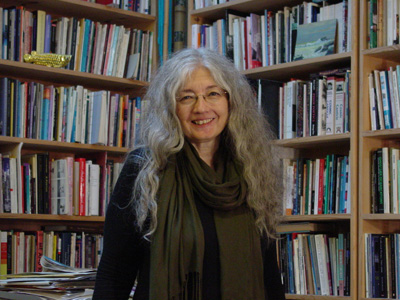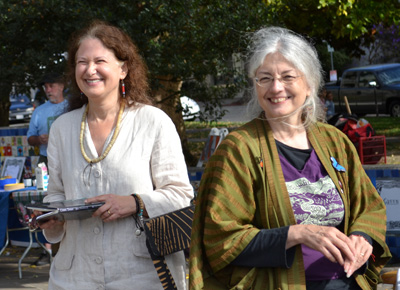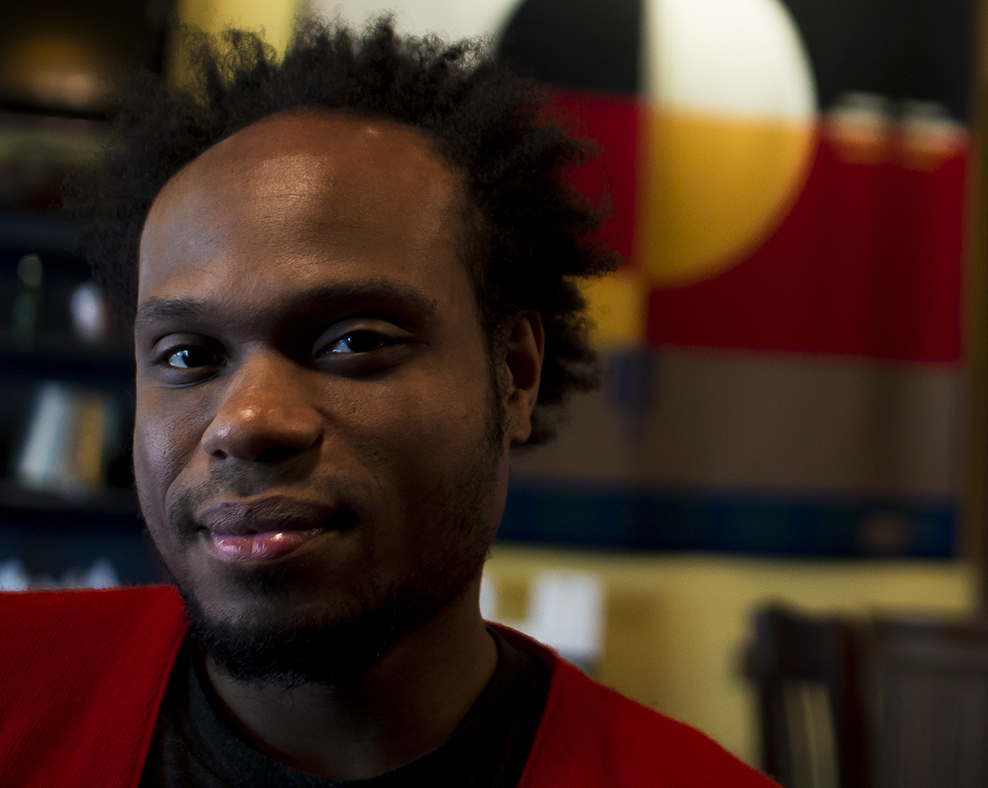When Love Arrives
Melvin Alvarez interprets a performance of “When Love Arrives” by Sarah Kay and Phil Kaye—codirectors of Project VOICE—in this typographic video that adds another level to a poem already full of art and meaning.
Jump to navigation Skip to content
Melvin Alvarez interprets a performance of “When Love Arrives” by Sarah Kay and Phil Kaye—codirectors of Project VOICE—in this typographic video that adds another level to a poem already full of art and meaning.
“I’ve never met anyone whose name starts with the letter Q so I know I’ll never have to mourn it.” Poet Jared Singer performs "How I learned my ABC's" at the 2012 NYC Urbana Poetry Slam.
“When you name your daughter it is a prayer for everything you want her to be.” Poet Rachel Rostad explores the power of a name, and what is lost when a person is renamed for cultural reasons.
If you attend poetry events in California with any regularity, you are likely to see Joyce Jenkins, who—with her long, wavy hair and graceful demeanor—is unmistakable in a crowd. Jenkins is the editor and executive director of Poetry Flash, Literary Review & Calendar for the West and chair of Northern California Book Reviewers. She is also the author of Portal and Joy Road, a limited edition chapbook. Her poems have appeared in Parthenon West Review, Ambush Review, ZYZZYVA, Addison Street Anthology: Berkeley's Poetry Walk, The Place That Inhabits Us: Poems of the San Francisco Watershed, and elsewhere.
Jenkins received an American Book Award in 1994 and the PEN Oakland Josephine Miles Lifetime Achievement Award in 2006, among other honors. Poetry Flash received Litquake's 2012 Barbary Coast Award. For many years, P&W has provided support to the Poetry Flash Reading Series and Watershed Poetry Festival in Berkeley. We were thrilled to be able to ask Jenkins a few questions about her 40 years at the helm of the "Flash." What makes Poetry Flash and its programs unique?
What makes Poetry Flash and its programs unique?
Publishing Poetry Flash: Literary Review & Calendar for the West for over 40 years has been an unparalleled journey for myself and associate editor Richard Silberg. We’ve documented poetry and changes in writing over an incredibly turbulent and transformative time, and acted as both a forum and catalyst for the development of literary communities up and down the West Coast. Thoughout the years we've always remained open to all styles and poetics.
Poetry Flash evolved from its 1972 origins as a single sheet to a monthly tabloid to its current incarnation as an online magazine. Today, Poetry Flash publishes a literary events calendar for all of California, poetry and fiction book reviews, poems, interviews, tributes, essays, memoir, calls for submissions, news, and online archives. Other publications offer book reviews, interviews, and poems, but lack the same historical perspective and that certain Poetry Flash attention to detail. Also, everything we publish is entwined with our involvement in events and outreach (a legacy from years of distributing the Flash as a free paper).
We have published 302 print issues of Poetry Flash that will continue to echo and provide future generations with essential literary documents that detail the history of poetry on the West Coast. We have that deep well to draw from in our efforts to further our collective understanding of the present.
Our other projects include the Poetry Flash Reading Series at bookstore venues in Berkeley and Oakland, and the annual presentation of the Northern California Book Awards in San Francisco—now in its 33rd year. Also, there is the annual Watershed Poetry Festival, directed by Mark Baldridge and supported in part by Poets & Writers, which will celebrate its 18th year on September 28, 2013, in Berkeley.
What recen t project have you been especially proud of?
t project have you been especially proud of?
I am proud of Watershed. It is a real statement to be there, to take part, and “stand up for the earth” as a poet, through poetry. I’m proud of the gorgeous hand-printed broadsides that commemorate and support the festival, the annual “Creek Poem” installation on the grounds of the festival, and the event for high school students at Berkeley High, which is held the day before the festival.
I’m also gratified and humbled by the number of incredible poets we have hosted in our reading series, from Czeslaw Milosz to Louise Glück. Furthermore, we have had the honor of recognizing amazing poets and writers through the book awards—talented writers from Al Young, Kay Ryan, and Adrienne Rich to Robert Duncan, Lawrence Ferlinghetti, and Maxine Hong Kingston.
What’s the craziest (or funniest or most moving or most memorable) thing that’s happened at an event you’ve hosted?
There are too many to choose from! My favorite was when Kenneth Rexroth escaped from the hospital, or said he did, to read at the San Francisco International Poetry Festival in 1980—an event that I directed and Poetry Flash co-sponsored. I had an image of him ripping tubes out of himself! Anyway, he arrived in a great flourish and gave me the critical once over. Then he extended his arm, and we promenaded about the lobby of the Palace of Fine Arts.
Other moments include a choral reading of “The State of the Planet” at Watershed by Robert Hass. There was Joy Harjo’s saxophone and “Eagle Poem” wafting across the park at another Watershed. And the time that Wanda Coleman read so fiercely and beautifully that she... well, she didn’t levitate, but it was close. We are talking a higher vibration. And maybe for just a moment there was a kind of translucence—her movements and language were so concentrated she almost became pure energy for a moment there.
How has literary presenting informed your own writing and/or life?
Literary presenting, whether through live events or through publishing Poetry Flash, either online or in print, is my life. I have learned so much—I’ve felt like I’ve been in graduate school for 40 years.
What do you consider to be the value of literary programs for your community?
Poetry Flash’s mission is to build community through literature, and that’s exactly what readings do—event by event. They give poets especially the sense that someone is listening, someone cares, and they are appreciated. It feeds back into better work and more awareness. We learn so much about other poets and writers whose work we may not have delved into. At the Poetry Flash Reading Series, we present many fine younger or emerging poets whose names may not yet be widely known. Our audiences hopefully will trust our curatorial instincts and try our readings, even if they don’t yet recognize the names. Our readers are excellent!
What are you most excited about in today’s changing literary landscape?
I’m most excited about the fact that—whatever changes technology or society brings us, whatever new forms poetry and writing take on—creative writing and reading willl continue to flourish in an amazing variety of ways. The explosion of readings, access to evolving modes of publication, and writing “springboards” and shelters provided by universities have all contributed to the preservation and continued growth of the literary arts. No matter what, poetry and writing will always remain central to human consciousness and our culture.
Photo 1: Joyce Jenkins. Credit: Mark Baldridge. Photo 2: Jenkins (at right) with Jane Hirshfield at the 2011 Watershed Poetry Festival. Credit: Sharon Coleman.
Major support for Readings/Workshops in California is provided by The James Irvine Foundation. Additional support comes from the Friends of Poets & Writers.
In this TED-Ed animated video, poet Gayle Danley artfully explains the five essential elements to becoming an effective slam poet.
“Since when does being a teacher mean having to swear not to help??” Dylan Garity performs “Rigged Game,” his poem about a flawed educational system, at the 2013 National Poetry Slam in Minneapolis, MN.
P&W-funded Jamaal May is a poet from Detroit, MI, where he taught poetry in public schools and worked as a freelance audio engineer and touring performer. His poetry won the 2013 Indiana Review Prize and appears in journals such as Poetry, Ploughshares, and The Believer. Jamaal has earned an MFA from Warren Wilson and fellowships from Cave Canem and Bucknell University. His first book is Hum (Alice James Books, 2013), and he is founder of the Organic Weapon Arts Chapbook Press.
 Writers frequently ask me how to get more readings. I’ve said for years I don’t know why people give me money and sit still to hear me recite poems. But now that this bizarre phenomenon has occurred more than 600 times in the last nine years (three funded by P&W), I have to admit I do know why I get so many readings, and only part of it is luck. The truth is people like to hear me read. So the better question to ask is “How can I give better readings of my work?” Below are my top five tips.
Writers frequently ask me how to get more readings. I’ve said for years I don’t know why people give me money and sit still to hear me recite poems. But now that this bizarre phenomenon has occurred more than 600 times in the last nine years (three funded by P&W), I have to admit I do know why I get so many readings, and only part of it is luck. The truth is people like to hear me read. So the better question to ask is “How can I give better readings of my work?” Below are my top five tips.
Use Your Everyday Inflection
It’s remarkable to watch a poet charismatically engage an audience with banter then slip into a monotone drone when the poem starts. I suspect part of the reason for the “monotone drone” or the equally disheartening “poet voice” is a fear of performing. Writers tell me they don’t want to perform or be seen as performative. I would argue that an overly dry, disengaged reading is in fact a performance. No one speaks that way. Conversely, our daily conversations are full of varied inflection and shifts in tone. Rather than try to perform a poem, practice reading it in your own voice as if you’re telling those lines to a friend.
Focus on the Words
Another pitfall is the inherent distraction of facing an audience. I’ve found it helpful to shift my thinking to the why behind each poem. Every word in your poem was chosen for a specific reason. Read them as if they have a place in the world. Did an image delight you enough to write it down? Don’t fight back your delight. Did it haunt you? Take your time and let us feel the specter. If we think deeply about every line read, we are less likely to fret over the presence of an audience. Engage the work and engagement with the crowd will follow.
Try to Memorize Your Poems
The emphasis here is on “try.” Many believe they will never have a good enough memory to recite poems by heart. Even if this is true, you should try anyway. It will make you more familiar with the poems, you’ll make eye contact more frequently, and read with more confidence. At the very least you’ll know that line you have to nail is coming up. You will nail it.
Be Nervous
We know from elementary science that energy can’t be destroyed, only changed. Nervousness is a kind of energy so apply this concept to it. I’m still nervous before every reading and I don’t try to stop it anymore. Nervousness means you care. Take it as a sign that you are present and paying attention, then turn that energy and focus towards your poems. Apathy is a much worse state of mind to approach a reading with. The only one worse than that is feigned apathy.
Risk Yourself
When we see a good poetry reading, we are witnessing a writer becoming open enough to get in touch with what they’ve written, the same openness they’ve implicitly asked of the audience. It takes a risk to stand in front of people as if you have something of value to share. Let that come through and be as uncool and awkward as you need to be to get it done. The writing deserves it.
Photo: Jamaal May. Credit: Tarfia Faizullah.
Support for Readings/Workshops events in Detroit is provided by an endowment established with generous contribution from the Poets & Writers Board of Directors, and others. Additional support comes from the Friends of Poets & Writers.
“I was told to speak up.” Poet Catalina Ferro describes a harrowing seating arrangement aboard an airplane in her poem, “Emergency Exit Row,” at the NYC Urbana Poetry Slam.
Poet Benjamin Barker performs his poem, “Rubik’s Cube,” at the 2013 National Poetry Slam in Salt Lake City, Utah.
“She was the first beautiful thing I ever got stuck on.” Poet Neil Hilborn performs his poem, “OCD,” at the 2013 Rustbelt Regional Poetry Slam.